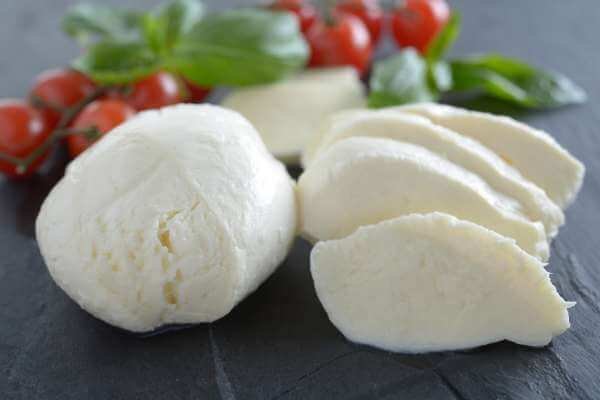As a dog owner, it’s natural to want to share your favorite foods with your furry friend. However, not all human foods are safe for dogs to consume. One such food that dog owners often wonder about is mozzarella cheese. Can dogs eat mozzarella cheese? The answer is not a straightforward yes or no.
Mozzarella cheese is a type of cheese that is made from cow’s milk. It is a popular ingredient in many Italian dishes, such as pizza and lasagna. While mozzarella cheese is not toxic to dogs, it is not recommended to feed it to them in large quantities. Dogs are lactose intolerant, which means they have difficulty digesting dairy products. Consuming too much mozzarella cheese can lead to gastrointestinal issues such as diarrhea, vomiting, and gas.
Can Dogs Eat Cheese?

As a dog owner, it’s important to know what human foods are safe for your furry friend to consume. Cheese is a food that many of us enjoy, but can dogs eat cheese? The answer is yes, but it depends on the type of cheese.
Some dogs may be lactose intolerant, which means they have difficulty digesting lactose, a sugar found in milk and dairy products. Cheese, including mozzarella cheese, contains lactose. For dogs with lactose intolerance, consuming cheese can lead to digestive issues such as diarrhea, vomiting, and gas.
However, for dogs that can tolerate lactose, cheese can be a tasty and nutritious treat. Mozzarella cheese is a good source of protein and calcium, which can help support your dog’s overall health. It’s important to remember that cheese should be given to dogs in moderation, as it is high in fat and calories.
When feeding your dog cheese, it’s best to stick to plain, unseasoned varieties. Avoid cheese with added herbs, spices, or other flavorings, as these can be harmful to your dog. Additionally, be sure to cut the cheese into small pieces to prevent choking hazards.
In conclusion, dogs can eat mozzarella cheese, but it should be given in moderation and only to dogs that can tolerate lactose. As always, it’s important to consult with your veterinarian before making any changes to your dog’s diet.
Health Implications of Feeding Cheese to Dogs
As a dog owner, you may be wondering whether it is safe to feed your furry friend mozzarella cheese. While cheese can be a tasty treat for dogs, there are some important health implications to consider before adding it to their diet.
Lactose Intolerance in Dogs
Like humans, some dogs may be lactose intolerant, meaning they have difficulty digesting lactose, a sugar found in milk and dairy products. Symptoms of lactose intolerance in dogs can include diarrhea, vomiting, and gas. If your dog experiences these symptoms after eating cheese, it may be best to avoid feeding them dairy products altogether.
Obesity and Weight Gain

Cheese is high in fat and calories, which can contribute to obesity and weight gain in dogs. Obesity can lead to a variety of health problems, including joint pain, heart disease, and diabetes. If you choose to feed cheese to your dog, it should be in moderation and as part of a balanced diet.
Risk of Pancreatitis
Cheese is also high in fat, which can increase the risk of pancreatitis in dogs. Pancreatitis is a condition in which the pancreas becomes inflamed and can be life-threatening if left untreated. Symptoms of pancreatitis in dogs include vomiting, diarrhea, and abdominal pain. If your dog has a history of pancreatitis or other digestive issues, it is best to avoid feeding them cheese.
In conclusion, while cheese can be a tasty treat for dogs, it is important to consider the potential health implications before adding it to their diet. If you choose to feed cheese to your dog, it should be in moderation and as part of a balanced diet. If you notice any symptoms of lactose intolerance, obesity, or pancreatitis in your dog, it is important to consult with a veterinarian.
Nutritional Content of Mozzarella Cheese

As a dog owner, it is important to know what human foods are safe for your furry friend to consume. Mozzarella cheese is a popular cheese that can be found in many households, but can dogs eat it? In this section, I will discuss the nutritional content of mozzarella cheese to help answer this question.
Fat Content
Mozzarella cheese is a high-fat cheese, with an average fat content of 6 grams per ounce. While fat is an important part of a dog’s diet, too much fat can lead to obesity and other health problems. It is recommended that dogs consume no more than 10% of their daily calories from fat.
Calcium and Vitamins
Mozzarella cheese is a good source of calcium, which is important for strong bones and teeth. One ounce of mozzarella cheese contains approximately 222 milligrams of calcium. Additionally, mozzarella cheese contains small amounts of vitamins A and B.
Calories
One ounce of mozzarella cheese contains approximately 85 calories. While this may not seem like a lot, it can add up quickly if your dog consumes too much cheese. It is important to remember that treats should only make up a small portion of your dog’s daily calorie intake.
In conclusion, mozzarella cheese can be a safe and tasty treat for your dog in moderation. However, it is important to keep in mind the high-fat content and calorie count. It is recommended to only give your dog small amounts of cheese as an occasional treat.
Safe Cheese Options for Dogs

As a dog owner, it is important to know what foods are safe for your furry friend to consume. Cheese is a popular treat for dogs, but not all types of cheese are safe for them to eat. In this section, I will discuss some safe cheese options for dogs.
Low-Fat Cheese
Low-fat cheese is a great option for dogs who love cheese but need to watch their weight. Cheese is high in fat and calories, so it should only be given to dogs in moderation. Low-fat cheese options include mozzarella, ricotta, and cottage cheese. These cheeses are lower in fat and calories than other types of cheese, making them a healthier option for your dog.
Cottage and Goat Cheese
Cottage cheese and goat cheese are also safe options for dogs to eat. Cottage cheese is high in protein and low in fat, making it a great addition to your dog’s diet. Goat cheese is also a good option, as it is lower in lactose than cow’s milk cheese. However, like all types of cheese, it should be given to your dog in moderation.
When giving your dog cheese, it is important to remember that it should only be given as an occasional treat. Too much cheese can lead to digestive issues, such as diarrhea and vomiting. Always check with your veterinarian before introducing any new foods to your dog’s diet.
In conclusion, there are safe cheese options for dogs, such as low-fat cheese, cottage cheese, and goat cheese. However, it is important to give cheese to your dog in moderation and as an occasional treat.
When to Consult a Veterinarian
As a dog owner, it is important to be aware of the potential risks associated with feeding your pet human food, including mozzarella cheese. While mozzarella cheese is generally safe for dogs to consume in small amounts, there are certain circumstances where it may be necessary to consult a veterinarian.
If your dog has a history of digestive issues or has experienced adverse reactions to other types of food, it may be best to avoid feeding them mozzarella cheese altogether. Additionally, if your dog is lactose intolerant, consuming mozzarella cheese could result in gastrointestinal discomfort or even diarrhea.
In more severe cases, consuming large amounts of mozzarella cheese could lead to pancreatitis, a condition that causes inflammation of the pancreas and can be potentially fatal if left untreated. Symptoms of pancreatitis in dogs include vomiting, diarrhea, loss of appetite, and abdominal pain.
If your dog has consumed a large amount of mozzarella cheese and is exhibiting any of these symptoms, it is important to seek veterinary care immediately. In some cases, your veterinarian may need to administer medication or antibiotics to help alleviate your dog’s symptoms and prevent further harm.
While mozzarella cheese can be a tasty treat for your furry friend, it is important to exercise caution and consult a veterinarian if you have any concerns about your dog’s health or well-being.
FAQ about Can Dogs Eat Mozzarella Cheese
Can dogs eat mozzarella pizza?
Dairy delight. Even when opting for leaner cheeses such as mozzarella, a classic choice for pizzas, it’s not advisable for your pet to indulge excessively in cheese. Cheese tends to be rich in fat and calories, potentially resulting in an overconsumption of calories for your furry friend.
Are any cheeses toxic to dogs?
The straightforward response to the question of whether dogs can consume cheese is that it varies from one dog to another. Cheese, in its basic form, is not inherently poisonous or harmful to dogs (except for blue cheese, as explained later). However, certain types of cheese may contain additional ingredients, such as onion, garlic, herbs, or other additives, which could potentially pose a risk to a dog’s well-being.
Why do dogs love cheese so much?
Dogs are often drawn to cheese due to its strong smell and rich flavor. The high fat and protein content in cheese can also make it particularly appealing to dogs. Additionally, cheese contains casein, a protein that can be addictive to some dogs, leading to a strong preference for this dairy product. However, it’s important to remember that while cheese can be a tasty treat for dogs, it should be given in moderation to avoid potential digestive issues.
Conclusion of Can Dogs Eat Mozzarella Cheese
In conclusion, while mozzarella cheese can be a tasty and occasional treat for dogs due to its high protein and calcium content, it should be fed in moderation. It’s important to consider the individual dog’s tolerance to dairy and to avoid excessive consumption, as some dogs may be lactose intolerant. As with any new food introduction, consulting a veterinarian is recommended to ensure that mozzarella cheese can be safely included in a dog’s diet.

